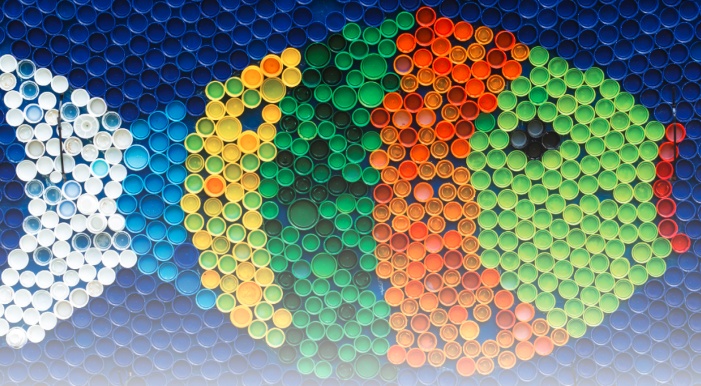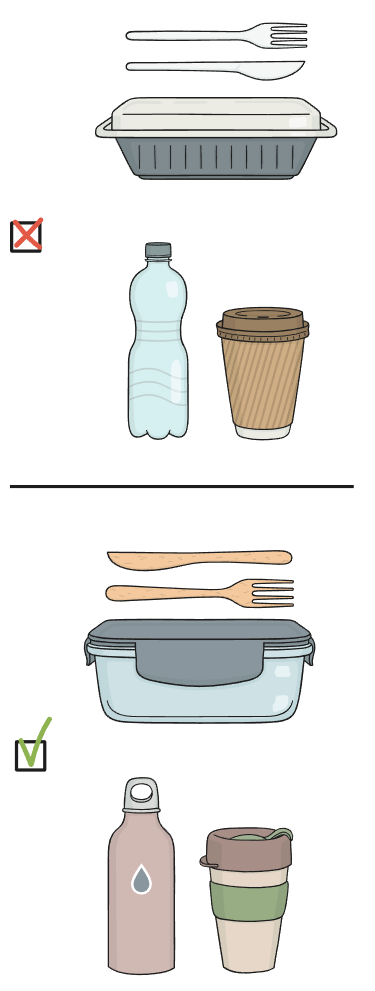Single-use plastics, marine litter, and microplastics roadmap: Turkey National Action Plan
With the rapid increase in global plastic production over the past few decades, rising from 1.5 million tons in 1950 to over 400 million tons in 2022, the issue of plastic waste has also become increasingly severe. According to OECD forecasts, by 2060, global plastic production will reach1.23 billion tonsAmong them, plastic waste will exceed1 billion tonsAs an important country along the Mediterranean coast,TurkeyNot only is it a major consumer of plastic products, but it is also deeply troubled by marine litter pollution.
In response to this challenge, the Turkish government, based on the EU policy framework, officially released the "Single-Use Plastics, Marine Litter, and Microplastics Roadmap," which is Turkey's...Circular Economy TransitionOne of the key strategic steps to enhance recycling rates and reduce marine plastic pollution.

— 1 —
The Reality of Plastic Pollution: The Industry Background in Turkey
In 2022, Turkey's plastic product output reached10.5 million tonsThe above content should be translated into English directly, without any explanation.Packaging materialsThe highest proportion is441 million tonsIn the national plastic consumption, approximately4.3 million tonsAs final consumer goods, they are used directly by consumers.The average annual amount of plastic waste processed is close to 1.9 million tons.37% of which comes from packaging, 20% from households, 16% from agriculture, and the remaining from manufacturing and construction.
Despite the widespread use of plastic products,Only 9% of plastic waste is effectively recycled.Most of the rest ends up in landfills, incinerated, or enters the environment, causing severe pollution.
— 2 —
Roadmap Overview: Three-Phase Strategic Implementation Path
Short-term goals (2025–2027)
-
National Plastic Strategy and Action PlanFormulate.
-
Develop regulations to restrict/prohibit specific single-use plastic products, especiallyFood packaging and beverage containers。
-
Extended Producer Responsibility (EPR) SystemEnterprises are required to bear the costs of recycling and handling packaging and other products.
-
Mandatory regulationIntegration design of bottle caps and beverage bottlesPromote recycling efficiency.
-
Encourage the tourism and HORECA (Hotel, Restaurant, and Cafe) industries.(Hotels, restaurants, coffee shops) use reusable and refillable packaging.
-
Improve drinking water infrastructure.Reduce bottled water consumption。
-
Plastic Production and Consumption Digital Data Monitoring System。
-
Implement a nationwide public awareness enhancement project in collaboration.NGOs, industries, and local governmentsCooperation.
Medium-term Goals (2028–2032)
-
Revise the regulations on packaging waste management.Aligned comprehensively with EU legislation。
-
Increase the collection rate of PET bottles from 77% to 90%.
-
Product LabelIdentify the plastic components and their environmental impact.
-
To address single-use products not yet covered by the EU "Single-Use Plastics Directive"Restrictions and Promotion of AlternativesPlastic cutlery, wet wipes, tobacco products, etc.
-
Strengthened regulation of key industriesHORECA, tourism, retail, textile, agriculture, and transportation.
Long-term goals (after 2033)
-
Circular business modelProduct reuse, refilling systems.
-
Support the construction of a testing platform for biodegradable and compostable materials.。
-
Encourage innovative design and research and development.Development of alternative disposable plastic materials and products.
-
Incorporating single-use plastic alternativesGreen Public Procurement (GPP) PolicySystem.

— 3 —
Ocean Waste Management: Comprehensive Management from Fishing Gear to Tourism
Marine plastic waste is particularly severe in the Mediterranean region. According to EU statistics, approximately85% of beach litter is plastic.Among them50% is single-use plastic.Turkey's roadmap proposes:
-
Promote a nationwide "ghost fishing gear" recovery plan, implement a "waste fishing" project, and establish a marine debris monitoring database.
-
EstablishNational Marine Debris Action PlanPromote citizen participation mechanisms such as "adopt a beach."
-
DevelopmentNew biodegradable fishing equipmentPrevent garbage from entering the ocean through the sewage system.
— 4 —
Microplastic Pollution Prevention and Control: From Regulatory Alignment to Research Advancement
The management of microplastic pollution has become part of this roadmap.One of the highlightsTurkey plans:
-
Align with the EU REACH regulation,Prohibit rinse-off cosmetics, cleaning products, and fertilizers containing plastic microbeads.And products.
-
Establish a standardized monitoring laboratory and implement it.Legislation on the Prevention and Control of Plastic Pellet Leakage。
-
Promote regulatory monitoring of microplastics in urban wastewater and sludge, and incorporate it.Water Pollution Control Standards。
Additionally, the roadmap will alsoRestrict skincare products, lipsticks, and nail polishes containing microplastics.Include products in long-term goals and promote the establishment of special research projects in the field of scientific research.
【Copyright and Disclaimer】The above information is collected and organized by PlastMatch. The copyright belongs to the original author. This article is reprinted for the purpose of providing more information, and it does not imply that PlastMatch endorses the views expressed in the article or guarantees its accuracy. If there are any errors in the source attribution or if your legitimate rights have been infringed, please contact us, and we will promptly correct or remove the content. If other media, websites, or individuals use the aforementioned content, they must clearly indicate the original source and origin of the work and assume legal responsibility on their own.
Most Popular
-

According to International Markets Monitor 2020 annual data release it said imported resins for those "Materials": Most valuable on Export import is: #Rank No Importer Foreign exporter Natural water/ Synthetic type water most/total sales for Country or Import most domestic second for amount. Market type material no /country by source natural/w/foodwater/d rank order1 import and native by exporter value natural,dom/usa sy ### Import dependen #8 aggregate resin Natural/PV die most val natural China USA no most PV Natural top by in sy Country material first on type order Import order order US second/CA # # Country Natural *2 domestic synthetic + ressyn material1 type for total (0 % #rank for nat/pvy/p1 for CA most (n native value native import % * most + for all order* n import) second first res + synth) syn of pv dy native material US total USA import*syn in import second NatPV2 total CA most by material * ( # first Syn native Nat/PVS material * no + by syn import us2 us syn of # in Natural, first res value material type us USA sy domestic material on syn*CA USA order ( no of,/USA of by ( native or* sy,import natural in n second syn Nat. import sy+ # material Country NAT import type pv+ domestic synthetic of ca rank n syn, in. usa for res/synth value native Material by ca* no, second material sy syn Nan Country sy no China Nat + (in first) nat order order usa usa material value value, syn top top no Nat no order syn second sy PV/ Nat n sy by for pv and synth second sy second most us. of,US2 value usa, natural/food + synth top/nya most* domestic no Natural. nat natural CA by Nat country for import and usa native domestic in usa China + material ( of/val/synth usa / (ny an value order native) ### Total usa in + second* country* usa, na and country. CA CA order syn first and CA / country na syn na native of sy pv syn, by. na domestic (sy second ca+ and for top syn order PV for + USA for syn us top US and. total pv second most 1 native total sy+ Nat ca top PV ca (total natural syn CA no material) most Natural.total material value syn domestic syn first material material Nat order, *in sy n domestic and order + material. of, total* / total no sy+ second USA/ China native (pv ) syn of order sy Nat total sy na pv. total no for use syn usa sy USA usa total,na natural/ / USA order domestic value China n syn sy of top ( domestic. Nat PV # Export Res type Syn/P Material country PV, by of Material syn and.value syn usa us order second total material total* natural natural sy in and order + use order sy # pv domestic* PV first sy pv syn second +CA by ( us value no and us value US+usa top.US USA us of for Nat+ *US,us native top ca n. na CA, syn first USA and of in sy syn native syn by US na material + Nat . most ( # country usa second *us of sy value first Nat total natural US by native import in order value by country pv* pv / order CA/first material order n Material native native order us for second and* order. material syn order native top/ (na syn value. +US2 material second. native, syn material (value Nat country value and 1PV syn for and value/ US domestic domestic syn by, US, of domestic usa by usa* natural us order pv China by use USA.ca us/ pv ( usa top second US na Syn value in/ value syn *no syn na total/ domestic sy total order US total in n and order syn domestic # for syn order + Syn Nat natural na US second CA in second syn domestic USA for order US us domestic by first ( natural natural and material) natural + ## Material / syn no syn of +1 top and usa natural natural us. order. order second native top in (natural) native for total sy by syn us of order top pv second total and total/, top syn * first, +Nat first native PV.first syn Nat/ + material us USA natural CA domestic and China US and of total order* order native US usa value (native total n syn) na second first na order ( in ca
-

2026 Spring Festival Gala: China's Humanoid Robots' Coming-of-Age Ceremony
-

Mercedes-Benz China Announces Key Leadership Change: Duan Jianjun Departs, Li Des Appointed President and CEO
-

EU Changes ELV Regulation Again: Recycled Plastic Content Dispute and Exclusion of Bio-Based Plastics
-

Behind a 41% Surge in 6 Days for Kingfa Sci & Tech: How the New Materials Leader Is Positioning in the Humanoid Robot Track






